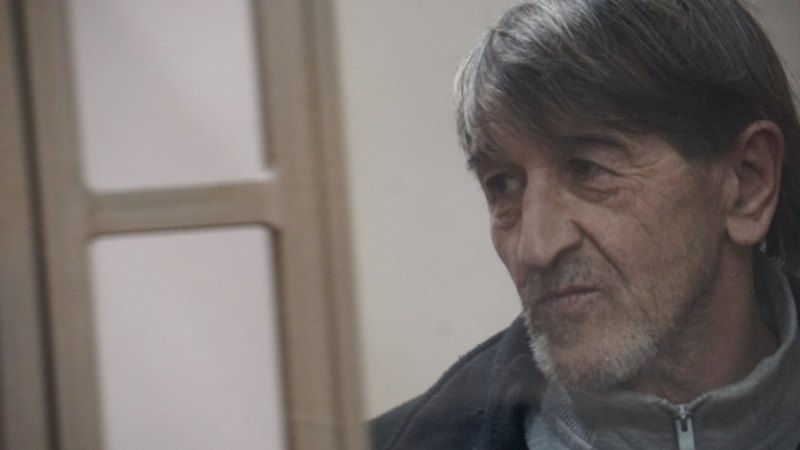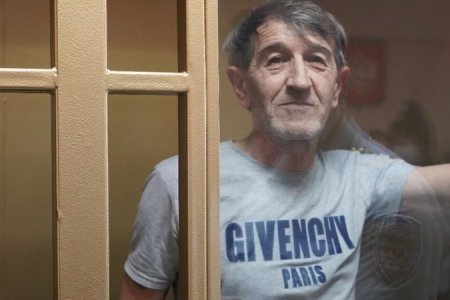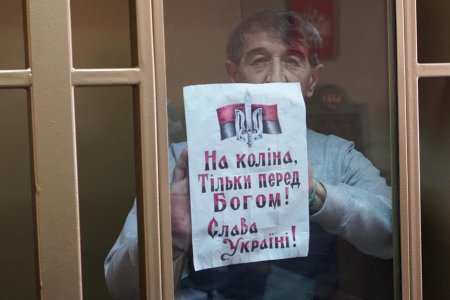
A new ‘trial’ is shortly to begin of Oleh Prykhodko, the 64-year-old Crimean currently serving a 5-year sentence on politically motivated ‘terrorism’ charges. It was feared back in March 2021 that the FSB might not tolerate a sentence so much shorter than the 11 years demanded by the prosecutor, and the new charges, based solely on alleged comments to cellmates, may well be a way of obtaining a longer sentence.
The court documents, although first reported only on 24 October, were registered on 19 October, at the Western District Military Court, The choice of another court, rather than the military court in Rostov, is presumably linked with where Prykhodko is currently imprisoned. This is to be a new ‘trial’ before presiding judge Yevgeny Vasilievich Zubov and two others.
It became clear earlier in 2023, when Prykhodko’s wife and daughter were prevented from seeing her after travelling to the notorious Vladimir Prison, that new charges were planned. It is now known that these are under two notoriously abused articles of Russia’s criminal code and based solely on claims made by Prykhodko’s cellmates. He is charged with ‘public calls to carry out terrorist activities, public justification of terrorism or propaganda of terrorism’ (Article 205.2 § 1). This is punished by anything from a steep fine to a term of imprisonment of up to five years.
He is further accused of so-called ‘rehabilitation of Nazism’ under Article 354.1 § 1. This article of the criminal code, which purportedly punishes those who ‘publicly deny or approve of the facts established by the Nuremberg Tribunal’, was criticized before its introduction in May 2014, and has already proven to be a weapon against historical truth. It was, for example, used in 2016 to prosecute Vladimir Luzgin for posting material that stated, entirely correctly, that both Nazi Germany and the USSR invaded Poland in September 1939. In September 2023, Sergei Volkov was convicted of this same charge and fined a massive two million roubles, also for writing of the collaboration between the USSR and Nazi Germany until June 1941, and for criticizing Soviet dictator Joseph Stalin.
The charges against Oleh Prykhodko are based on claims that he “promoted acts of terrorism’ and “praised the actions of Hitler and his supporters during WWII”. The only ‘proof’ of this will come from the testimony of fellow prisoners who either collaborate with the prison authorities for personal gain (better conditions, etc.) or can be easily threatened or coerced into providing the required denunciations. There is, in short, every reason to assume that this second ‘trial’ will be as flawed as the first.
Oleh Prykhodko was one of several Ukrainians in occupied Crimea to be arrested in late 2019 after the Kremlin was forced to release 35 Ukrainian political prisoners in exchange, primarily, for Volodymyr Tsemakh, an important MH17 witness (and possibly suspect).
The almost open fabrication of the charges against him was, in fact, very reminiscent of the prosecution against one of the released political prisoners, Volodymyr Balukh, another Ukrainian who had never concealed his opposition to Russia’s invasion of Crimea.
Prykhodko was arrested in the evening of 9 October 2019 by FSB officers who made no effort to search a second garage after claiming to have ‘found’ explosives in Prykhodko’s first garage. The Ukrainian had already suffered constant harassment and administration prosecution because of his pro-Ukrainian views and had every reason to expect such FSB or occupation police ‘searches’. He also used his garages for welding and soldering and would have needed to be suicidal to store flammable substances (as claimed) near his equipment.
The initial charge was of planning to blow up the Saki City Administration building. Three months later, however, the prosecution added the even more surreal charge of having planned to set fire to the Russian general consulate building in Lviv, Western Ukraine, with the alleged ‘proof’ of this lying in a telephone and a memory stick.
The defence provided clear evidence that the charges were falsified, however this was, typically, ignored by the panel of judges at the notorious Southern District Military Court in Rostov (Russia). On 3 March 2021, presiding ‘judge’ Alexei Abdulmazhitovich Magomadov; together with Kyrill Nikolayevich Krivtsov and Sergei Fedorovich Yarosh found Prykhodko guilty of all charges, however removed the charge under Article 223.1 (preparing explosives) as being time-barred. Prykhodko was sentenced to five years’ harsh-regime imprisonment with the first year in a prison, the worst of all Russian penal institutions. He was also fined 100 thousand roubles. As mentioned, this was significantly lower than the 11-year harsh-regime sentence demanded by Russian prosecutor Sergei Aidinov. On 17 May 2021, the sentence was upheld by the Military court of appeal in Vlasikha (Moscow region). An extra month was later added after Prykhodko was found guilty of ‘contempt of court’ over his (strongly worded!) abuse of two prosecution witnesses who stood up in court and lied about the ‘testimony’ which the defence had shown to be falsified.
The authoritative (and itself persecuted) Memorial Human Rights Centre declared Oleh Prykhodko a political prisoner back in April 2021. They found the case against the Ukrainian activist falsified and lacking in any elements of a crime. It was clear, they said, that he had been arrested and tried purely because of his political views, in particular his unwavering opposition to Russia’s occupation of his native Crimea.
There seem no grounds for believing that the new charges against Oleh Prykhodko, who is turning 65 on 21 November, would be viewed as any less politically motivated.


